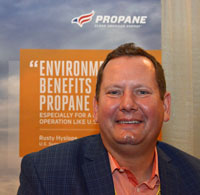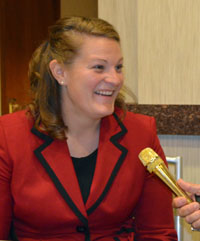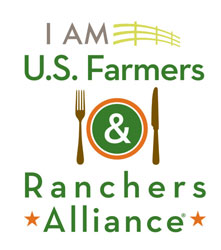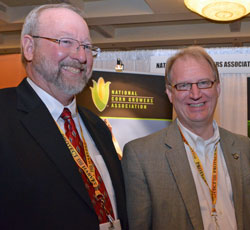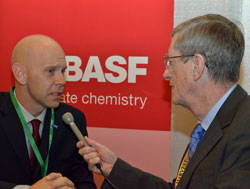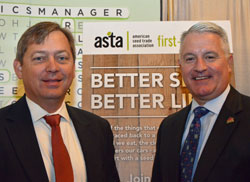 A human nutritionist by trade, Nikki Putnam, is a registered dietitian nutritionist for Alltech. Her focus is to help bridge the gap between producers and consumers. We are seeing a ‘consumer-push’ for natural or traceable production and antibiotic-free functional foods. So, what does the future look like for food companies? Nikki shared some insight into what Alltech is doing to help future-proof food while attending the recent NAFB’s Trade Talk.
A human nutritionist by trade, Nikki Putnam, is a registered dietitian nutritionist for Alltech. Her focus is to help bridge the gap between producers and consumers. We are seeing a ‘consumer-push’ for natural or traceable production and antibiotic-free functional foods. So, what does the future look like for food companies? Nikki shared some insight into what Alltech is doing to help future-proof food while attending the recent NAFB’s Trade Talk.
“What we are looking to do is help those farmers and ranchers stay relevant for the next 10, 20, 30, 40 years. By doing that, we are listening to the consumers, asking them what they want and then going back to the producers and providing them innovative solutions to then provide that to the consumer through their food products.”
Producers must still meet that bottom-line, understand the return on investment while still being innovative on farm. Nikki said one thing they have most recently seen success with is creation of functional foods. Listen to my complete interview to hear examples of programs they have created to not only bridge the gap, but also build consumer trust. Interview with Nikki Putnam, Alltech
 From the beginning, Alltech’s approach to animal health has been to look for solutions that are natural and not to simply jump to antibiotics. The Veterinary Feed Directive (VFD) has been a key talking point for the last year and Alltech’s Dr. Amanda Gehman shares more about a lifetime approach to antibiotic-free production.
From the beginning, Alltech’s approach to animal health has been to look for solutions that are natural and not to simply jump to antibiotics. The Veterinary Feed Directive (VFD) has been a key talking point for the last year and Alltech’s Dr. Amanda Gehman shares more about a lifetime approach to antibiotic-free production.
“We are able to show a lifetime approach in multiple species in multiple ways without the need to depend on the use of antibiotics.”
Listen to my complete interview as Amanda takes us through their work in beef, poultry, dairy and how they are helping their producers adopt the new guidelines from VFD. Interview with Dr. Amanda Gehman, Alltech
View and download photos from the event here: NAFB Convention Photo Album


